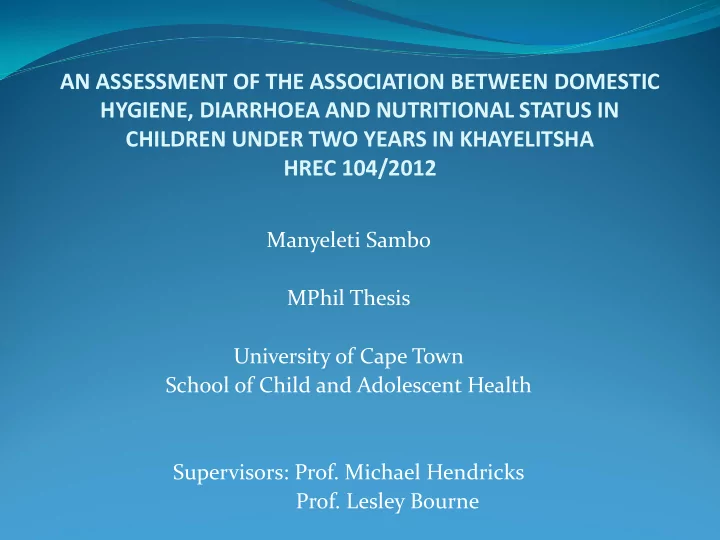

AN ASSESSMENT OF THE ASSOCIATION BETWEEN DOMESTIC HYGIENE, DIARRHOEA AND NUTRITIONAL STATUS IN CHILDREN UNDER TWO YEARS IN KHAYELITSHA HREC 104/2012 Manyeleti Sambo MPhil Thesis University of Cape Town School of Child and Adolescent Health Supervisors: Prof. Michael Hendricks Prof. Lesley Bourne
BACKGROUND
BACKGROUND
BACKGROUND
Diarrhoea Deaths in Cape Town 2009 Neonatal 35% Diarrhoea 16% Pneumonia 13% Causes of death in children under 5 years, Western Cape 2009. Groenewald, et al. 2012
Diarrhoea cases in Khayelitsha Source: De Azevedo, 2011. The Diarrhoeal Disease Season Plan in Cape Town
Objectives To determine the anthropometric status of children <2 years who had not experienced diarrhoea the previous month before the study To observe hygiene practices of mothers/caregivers in the home environment To explore the relationship between socio- demographic factors, domestic hygiene and diarrhoea
Methodology Case Control design Control Case No diarrhoea Diarrhoea (age <2yrs) (age <2yrs) No diarrhoea episode No diarrhoea episode (1 month before study) (1 month before study) HIV negative status HIV negative status
METHODOLOGY Stratified sampling method The sample size of 200 was proportionally allocated to each clinic, based on the number of diarrhoea cases seen per day City Health/Provincial clinics Cases Controls Nolungile clinic 52 52 Matthew Goniwe clinic 4 4 Town Two clinic 8 8 Zakhele clinic 1 1 Khayelitsha site B CHC 35 35 Total 100 100
Data Collection for Anthropometry
Data Collection Study population (200) Cases (100) Controls (100) 100 Questionnaires 100 Questionnaires 100 Anthropometry 100 Anthropometry 46 Household observations 46 Household observations
Analysis Descriptive analyses were performed using frequencies and percentages (%) Logistic regression was used to identify possible predictors of diarrhoea for each variable.
Anthropometry Results > 2 SD - 2 to +2 SD < - 2 SD WAZ HAZ WHZ
Multiple logistic results OR 95% CI p-values Variables 2.79 1.25-6.21 0.012* Child care by family/relative/day-care 0.39 0.19-0.84 0.015* Wash dishes in container 0.38 0.91-0.98 0.046* Grandmother preparing food for child 2.01 0.93-4.33 0.074 Rats in the house 2.21 0.91-5.40 0.081 Toilet problems 1.72 0.91-3.27 0.096 Kitchen not separate from other rooms 1.73 0.93-3.22 0.083 Maternal/caregiver < 25 years
LIMITATIONS HIV status could not be confirmed in most of the cases and controls Not all households were located for hygiene observations. Not all variables on the checklist were observed Data was collected in both summer and winter seasons
STRENGTHS OF STUDY The case-control study assessed multiple risk factors It obtained findings quickly Required minimal funding and limited resources Logistic regression was used to control for mediating and confounding factors
Conclusion Mothers provide a protective effect for children from diarrhoea Grandmothers have a protective effect for diarrhoea when they prepare food for the child Kitchen sink does not have a protective effect from diarrhoea
Recommendations Fig 2: Fecal-oral transmission
Recommendations Health Care facilities, Day Care facilities and community health promotion, education and interventions Breastfeeding Safe food preparations Hygiene (water and sanitation) Maintenance and proper use of private and public toilets Waste management and pest (rats & flies) control
Acknowledgements Prof. Michael Hendricks Prof. Lesley Bourne Participants Mrs Jawaya Shea Dr Christiaan van Woerden
Recommend
More recommend